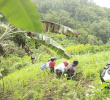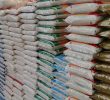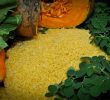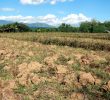Acef, according to Arnado, only ended in the hands of dubious beneficiaries. This, he said, was proven by the government audit firm itself.
By ALEX D. LOPEZ
Davao Today
DAVAO CITY, Philippines — The government’s recent announcement to release loan funds anew to the agriculture sector may sound like a piece of good news. But poor farmers are not happy with it.
To them, the 2.7 billion-peso (USD 0.06B) Agricultural Competitiveness Enhancement Fund or Acef that Agriculture Secretary Proceso Alcala said the government is offering again, starting next month, is another waste of government resources.
As in the past years, the Acef did not benefit the ordinary farmers, said Pedro Arnado of the peasant group Kilusang Magbubukid ng Pilipinas (KMP)-Southern Mindanao.
Acef, according to Arnado, only ended in the hands of dubious beneficiaries. This, he said, was proven by the government audit firm itself.
Arnado is referring to a Commission on Audit (COA) report suggesting irregularities in the release of the fund.
Among the problems discovered by COA in its 2010 audit report include the release of funds to loan recipients whose proponents did not provide complete information, and grant of loans with zero interest and collaterals.
These resulted to difficulties in tracking down loan recipients. The report showed that the total amount released to loan recipients who did not reply to the inquiries made by the agency, or whose letters were returned to sender almost reached 2.5 billion pesos (USD 0.059B).
The same report also cited that a total loan of 66.4 million pesos (USD 1.57M) have also been identified as having “negative results and/or having deficiencies.” (See table of COA findings sourced from www.coa.gov.ph)
Also, the same report indicated that of the total loan receivables of 8.1 billion pesos (USD 0.19B), 63 percent or 5.1 billion pesos (USD 0.12B) pertain to the loans granted to proponents of Acef with zero interest and without collaterals.
Enacted in 1996, by virtue of Republic Act 8178, the Acef was created as a mechanism to provide financial support to the agriculture and fishery sectors to increase their competitiveness in the local and global markets.
Acef funds was sourced from tariff collected from imported agricultural products within the Minimum Access Volume, a specified volume of products allowed to be imported with a lower tariff as committed by the Philippines to the World Trade Organization or WTO under the Uruguay Round Final Act.
The Act expired in December 2007 but the Congress on February 28, 2008 passed RA 9496 that extended the life of Acef up to year 2015.
The fund’s technical support is handled by the Department of Agriculture, while its management is under an Executive Committee headed by the Agriculture Secretary and co-chaired by the heads of the Congressional Oversight Committee on Agriculture and Fisheries Modernization or COCAFM.
At present, it is headed by Secretary Alcala and co-chaired by Senator Francis Pangilinan and Congressman Mark Llandro Mendoza representing COCAFM.
In his briefer and updates on the utilization of ACEF dated January 31, 2011 presented to the en banc meeting of COCAFM, DA Undersecretary Antonio Fleta said that from year 2000 up to 2010, the total past due loans on Acef amounted to 1.4 billion pesos (USD 0.03B) while the total outstanding loan incurred in the same period reached 5.9 billion pesos (USD 0.14B).
Fleta assured however that steps have already been taken by the agency to ensure collections especially to delinquent accounts, such as legal action and demand letters; requiring debtors to submit rehabilitation/restructuring plans; mandating the DA regional offices to evaluate and endorse time frames for extension of loan payments; and, property verification for accounts who were not responding to and/or not communicating with the DA-Acef.
The DA has announced that they will accept documents and proposals for the Acef starting next month.
But for farmers like Arnado, this means nothing.
“Bilyon-bilyon ang atong madungog kada tuig nga alokasyon alang sa mga mag-uuma. Pero, adtoa ang ka-barangayan og tan-awa ang sitwasyon sa mga mag-uuma. Latas sa katuigan, taliwala niining bilyones nga gipagawas sa panggamhanan, nag-ilaid gihapon sa kalisud tungod sa kawalay-yuta nga matikad, pagpahimulos sa ilang produkto ug walay ensakto nga suporta gikan sa gobyerno, (We heard billions of pesos allocated for farmers each year. But go to the rural villages where you can see the situation of farmers have not changed through the years. As billions of pesos are released by the government, farmers continue to suffer from severe poverty due to landlessness, from having their products taken advantage of by traders and the absence of genuine support from the government),” Arnado commented. (Alex D. Lopez, davaotoday.com)










